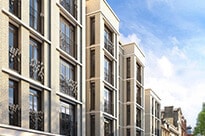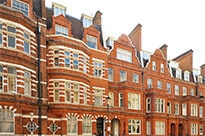5th February 2017
9mins
While one door closes, the UK’s remains open

The UK offers residence and citizenship to entrepreneurs and investors who meet certain conditions, and 68 such visas were issued last year to citizens from the seven countries affected by the travel ban, namely Iran, Iraq, Somalia, Sudan, Syria and Yemen, according to law firm Collyer Bristow. Lawyers from the firm see “significant scope for increase” in such issuance, given “established routes to residency, an attractive tax regime, the global commercial hub of London and a rich cultural life.”
Prime Minster Theresa May condemned Trump’s ban as “divisive and wrong”. The UK in general, and London in particular, has long been an attractive destination for international investors, especially those from more volatile parts of the world, offering as it does a stable political and legal system and a multicultural and tolerant environment. As Brexit looms, the UK will be redoubling its efforts to remain open to international investment and high-net-worth residency.
At the time of writing, a long legal battle over the ban seems likely, following judicial moves blocking the order. However, regardless of the ultimate outcome, for many potential investors the damage will have been done. Indeed, the effects of the US ban are likely to be felt much more widely than the seven countries targeted, suggests Black Brick Managing Partner Camilla Dell: “This move is likely to create concerns across the Middle East and beyond – it generates enormous uncertainty. Not only is it going to discourage investment, but lots of our clients from the region send their children to US universities – a lot of them will be thinking twice.”
Indeed, its not only those from Middle Eastern and Muslim countries that may feel targeted by a more hostile US administration: China has come in for considerable criticism from Trump on the campaign trail, and Chinese investors may rethink their plans if they feel the risk of arbitrary or ad hoc measures in the US has risen.
According to real estate services firm Cushman & Wakefield, Chinese overseas investment in commercial real estate increased 49% in 2016. While the US was the largest destination, investment in the UK jumped 32% from 2015, as sterling’s fall made the UK more attractive. According to research from the Hunan Research Institute, almost two-thirds of Chinese high-net-worths plan to buy overseas real estate in the next three years, with a view to get at least a third of their wealth out of the country.
“Chinese buyers have long favoured investment in London, whether for reasons of diversification, cultural attractions or to send their children to our universities,” says Caspar Harvard-Walls, a Partner at Black Brick. “If they perceive the US as becoming less welcoming, London can only benefit.”

The Alpha Cities Index, compiled by Warburg Realty and Barnes International Realty, in association with publisher Wealth-X, ranks cities on a range of practical, emotional and financial factors. London scored 77 out of 100, beating New York (75), Tokyo (70) and Sydney (60).
The factors included its travel connections, access to top universities, personal safety and environmental considerations, as well as social and networking opportunities, cultural richness, and luxury shopping. Financial factors assessed included the ease of doing business, property value for money, tax regimes and financial security.
Inheritance tax changes on the way

This removes the last tax advantage of using such structures, which are already subject to rising levels of ATED (Annual Tax on Enveloped Dwellings). ‘De-enveloping’ such structures does, however, incur a tax liability, and potentially a substantial one. We would strongly recommend any of our clients that have not addressed this issue to seek the appropriate legal and accounting advice, and we would be delighted to recommend specialists who can help.
Feeling the effect of the Elizabeth Line

Figures from property crowdfunding platform Property Partner show that most areas around stations on the new line have seen substantially higher-than-average price rises.
It found that, over the past decade, all 40 stations along the 73-mile line – which will extend to the west and east of London – have achieved price rises nearly double the average for England as a whole.
The highest rises have been recorded around Central London stations Tottenham Court Road and Bond Street, both up almost 66%. Near London, Hanwell (59.21%), West Ealing (56.82%), Ealing Broadway (57.48%) and Acton Mainline (57.70%) have also performed strongly.
“Despite these prices rises, it’s not too late to profit from the Elizabeth Line,” says Dell. “Some of these areas, such as Woolwich and Custom House still offer value for money, and we’re likely to see another bounce when the line opens next year.”
Airbnb introduces 90-day letting cap

The move is in response to concerns from local authorities about the declining supply of longer-term rentals in some areas, and complaints from residents about the coming and going of short-term Airbnb tenants. Property owners were already legally required to seek planning permission to let homes out on a short-term basis, but councils have not had the resources to enforce the rules.
“We would strongly recommend that, for long-term buy-to-let investors, the best approach is to find long-term tenants,” says Dell at Black Brick. “The income is much more predictable, and it avoids the hassle and expense of constant handovers. Our property management service can help to find such tenants, and manage the entire relationship if preferred.”
Acquisition of the month – Young Street, W8

We identified a number of gated developments in our clients’ preferred area and, given limited stock on the market, we made private approaches to owners and residents who were not openly looking to sell. We struck gold with
21 Young Street, a new off-plan development by Grainger Plc in a prime location just off High Street Kensington and Kensington Gardens.
This boutique development has just 53 apartments, with 24-hour concierge, a residents’ gym, screening room, library and gardens. The development has seen a huge amount of interest since the launch with very little open marketing and we were one of the very first into the scheme, securing a 3-bed, 1,690 square foot duplex Mews house style apartment for £3.9 million, negotiating £50,000 off the asking price as well as the addition of a secure parking space.

Hans Road, Knightsbridge SW1X Overlooking Harrods Department Store, this three-bed, two-bath apartment, offered by a motivated seller, benefits from a long lease (132 years), a caretaker service and lift. At a guide price of £2.215 million, this equates to £1,934 per square foot, which is excellent value for such a great location in prime Knightsbridge.
For more details, to arrange a viewing or to see what else we are currently selling please contact Caspar Harvard Walls chw@black-brick.com or call +447827277741.
We would be delighted to hear from you to discuss your own property requirements. For a non-obligatory consultation, please contact us.